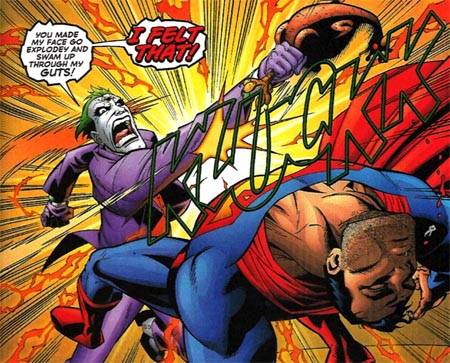
The ongoing battle over the psychological effects of violent games continues in a recent study published in the most recent edition of Cyberpsychology, behavior and social networking. From the abstract:
Christian Happ and his colleagues recruited 60 students (20 men) with varied video gaming experience and had them spend 15 minutes playing the violent and bloody beat-em-up game Mortal Combat vs. DC Universe on the Playstation 3. Some of the participants played the morally good character Superman, while the others played the Joker, the baddie from Batman. Apart from that, the game experience was the same for all participants – their time was spent in hand-to-hand combat against a variety of other computer-controlled game characters.
Another twist to the experiment was that before the game began half the participants read a bogus Wikipedia article about their character, designed to encourage them to empathise with him. For those playing Superman, the article said how he’d come from a loving family. The Joker article described how he’d suffered abuse in his childhood.
After playing the video game, the participants looked at grids of faces on a computer screen and indicated how hostile they looked. Some of the grids contained angry faces, but the crucial test was how hostile the participants rated the grids that contained all neutral faces. The key finding here was that participants who’d played the Joker were more likely to perceive hostility in neutral faces (a marker of an aggressive mindset), as compared with the participants who played Superman.
Another test was an old favourite known as the “lost letter technique”. As the students left the lab, they saw a stamped and addressed envelope on the floor outside. Those who’d played Superman in the violent game were 6.2 times more likely to post the letter or hand it in to the researchers, as compared with those who played The Joker (the rates were 20.7 per cent vs. 3.3 per cent, respectively).
Beyond the typical question of whether on-screen violence leads to real life violence, this study adds the fascinating question of how games impact sociability generally. However, as always with media effects studies, there is lots of room to challenge the results. For example, did participants’ past knowledge of Superman and the Joker change how they related to the character? Did the violence matter, or would the effect have been the same if the participants had spent 15 minutes solving puzzles as Superman or the Joker?
 Communications Law
Communications Law
Thanks for this post Greg. It’s always special to have an alum of the class in the fold (so to speak) in any way, shape or form.
There is something which the article and your musings makes me wonder about.
Clearly short term responses can be triggered by games, music, movies. Remember once coming out of a film that had a lot of aggressive driving in it and feeling (momentarily) a little too filled with adrenalin as I took the wheel of my car. Still, my sense is that the effect does not last very long (believe there may actually be some research on this).
Moreover I wonder if it is really correct that perpetuating actual real-life violence is simply further along the same continuum as feels of aggression. Likewise it seems doubtful to me that acts of selfless heroism are simply further along the same continuum as feeling good about oneself. Feels like the model must be a stair-step one where one’s state actually changes. The way water can change into something very different. Steam when boiled, ice when frozen.
In a sense discovering what makes us boil and what makes us freeze is the real trick. Suspect video-games may move us along the continuum but don’t really make us change our state either way. That would be something a lot deeper then a game, probably lodged in our subconscious or neurological base.
jon